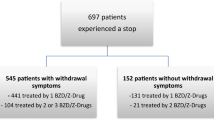Abstract
Benzodiazepines (BZDs) lose their benefits as anxiolytics and sedatives with longer-term use, due to the development of tolerance, as well as the development of harms (e.g. dependence, impaired cognition and other CNS effects). Older patients are at increased risk of BZD-related harms, including fractures and falls. Deprescribing BZDs in this patient population should be done slowly to avoid withdrawal syndrome, and should use a multifaceted stepwise approach.

Similar content being viewed by others
References
Ng BJ, Le Couteur DG, Hilmer SN. Deprescribing benzodiazepines in older patients: impact of interventions targeting physicians, pharmacists, and patients. Drugs Aging. 2018;35(6):493–521.
Vinkers CH, Olivier B. Mechanisms underlying tolerance after long-term benzodiazepine use: a future for subtype-selective GABA(A) receptor modulators? Adv Pharmacol Sci. 2012;2012:416864.
Dell’osso B, Lader M. Do benzodiazepines still deserve a major role in the treatment of psychiatric disorders? A critical reappraisal. Eur Psychiatry. 2013;28(1):7–20.
American Geriatrics Society 2015 updated Beers Criteria for potentially inappropriate medication use in older adults. J Am Geriatr Soc. 2015;63(11):2227–46.
O’Mahony D, O’Sullivan D, Byrne S, et al. STOPP/START criteria for potentially inappropriate prescribing in older people: version 2. Age Ageing. 2015;44(2):213–8.
Reeve E, Gnjidic D, Long J, et al. A systematic review of the emerging definition of ‘deprescribing’ with network analysis: implications for future research and clinical practice. Br J Clin Pharmacol. 2015;80(6):1254–68.
Markota M, Rummans TA, Bostwick JM, et al. Benzodiazepine use in older adults: dangers, management, and alternative therapies. Mayo Clin Proc. 2016;91(11):1632–9.
Petrovic M, Pevernagie D, Mariman A, et al. Fast withdrawal from benzodiazepines in geriatric inpatients: a randomised double-blind, placebo-controlled trial. Eur J Clin Pharmacol. 2002;57(11):759–64.
Reeve E, Ong M, Wu A, et al. A systematic review of interventions to deprescribe benzodiazepines and other hypnotics among older people. Eur J Clin Pharmacol. 2017;73(8):927–35.
Gould RL, Coulson MC, Patel N, et al. Interventions for reducing benzodiazepine use in older people: meta-analysis of randomised controlled trials. Br J Psychiatry. 2014;204(2):98–107.
Paquin AM, Zimmerman K, Rudolph JL. Risk versus risk: a review of benzodiazepine reduction in older adults. Expert Opin Drug Saf. 2014;13(7):919–34.
Tannenbaum C, Martin P, Tamblyn R, et al. Reduction of inappropriate benzodiazepine prescriptions among older adults through direct patient education: the EMPOWER cluster randomized trial. JAMA Intern Med. 2014;174(6):890–8.
Martin P, Tannenbaum C, Tamblyn R, et al. D-prescribe overtakes empower in patient-centered deprescribing of benzodiazepines: preliminary results from a pragmatic cluster-randomized community-based trial in Canada [abstract no. P3]. J Am Geriatr Soc. 2017;65(Suppl 1):S1–2.
Mugunthan K, McGuire T, Glasziou P. Minimal interventions to decrease long-term use of benzodiazepines in primary care: a systematic review and meta-analysis. Br J Gen Pract. 2011;61(590):e573–8.
Salonoja M, Salminen M, Aarnio P, et al. One-time counselling decreases the use of benzodiazepines and related drugs among community-dwelling older persons. Age Ageing. 2010;39(3):313–9.
Darker CD, Sweeney BP, Barry JM, et al. Psychosocial interventions for benzodiazepine harmful use, abuse or dependence. Cochrane Database Syst Rev. 2015;5:CD009652.
Denis C, Fatseas M, Lavie E, et al. Pharmacological interventions for benzodiazepine mono-dependence management in outpatient settings. Cochrane Database Syst Rev. 2006;3:CD005194.
Voshaar RC, Couvee JE, van Balkom AJ, et al. Strategies for discontinuing long-term benzodiazepam use: meta-analysis. Br J Psychiartry. 2006;189:213–20.
Brett J, Murnion B. Management of benzodiazepine misuse and dependence. Aust Prescr. 2015;38(5):152–5.
Westbury J, Jackson S, Gee P, et al. An effective approach to decrease antipsychotic and benzodiazepine use in nursing homes: the RedUSe project. Int Psychogeriatr. 2010;22(1):26–36.
Westbury J, Tichelaar L, Peterson G, et al. A 12-month follow-up study of “RedUSe”: a trial aimed at reducing antipsychotic and benzodiazepine use in nursing homes. Int Psychogeriatr. 2011;23(8):1260–9.
Author information
Authors and Affiliations
Consortia
Ethics declarations
Conflict of interest
The article was adapted from Drugs & Aging 2018;35(6): 493–521 [1] by employees of Adis/Springer, who are responsible for the article content and declare no conflicts of interest.
Funding
The preparation of this review was not supported by any external funding.
Rights and permissions
About this article
Cite this article
Adis Medical Writers. Take a multifaceted stepwise approach when deprescribing benzodiazepines in older patients. Drugs Ther Perspect 35, 72–76 (2019). https://doi.org/10.1007/s40267-018-0578-z
Published:
Issue Date:
DOI: https://doi.org/10.1007/s40267-018-0578-z




